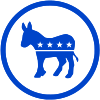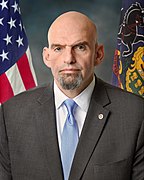|
Pennsylvania Democratic Party
The Pennsylvania Democratic Party is the affiliate of the Democratic Party in the U.S. state of Pennsylvania. It is headquartered in Harrisburg and is the largest political party in the state. Its chair is Senator Sharif Street. As of 2025, it controls two out of five statewide offices, one U.S. Senate seat, 7 out of 17 U.S. House seats, and the Pennsylvania House of Representatives. Along with the Pennsylvania Republican Party, it is one of the two major parties in the state. Governor Josh Shapiro is a Pennsylvania Democrat. PlatformThe state Democratic Party has recently made economic factors a major component of its platform, with advocacy for middle class workers of particular prominence. The party has also opposed Republican-sponsored legislation to require a photo ID for voting, asserting that such a requirement would discourage minorities, youth, and those with low incomes from voting because they are less likely to possess a state-issued ID. Additionally, the party has committed itself to maintaining the social safety net and encouraging more transparency in state government.[3] Key issues for the party include affordable healthcare, jobs and wages, support for workers and unions, fairer taxes, strong public education, retirement security, civil rights, environmental protection, marijuana legalization, and criminal justice reform.[4] A priority for Pennsylvania Democrats in the 2010s and 2020s has been increasing the minimum wage.[5] HistoryEarly historyThe Pennsylvania Democratic Party traces its history to 1792. Pennsylvania Democrat James Buchanan was elected president in 1856 but did not seek re-election four years later, when Abraham Lincoln, a Republican, was elected president. Buchanan's rise and fall from political prominence coincided with that of the Democratic Party in Pennsylvania; for much of the late nineteenth and early twentieth century, the party was largely out of power.[6][7] Recent historyThe party held the governorship from 2003 to 2011 with the election of Ed Rendell in 2002 and his re-election in 2006. The party lost control of the governorship following the election of Republican Tom Corbett in 2010. The party picked up a U.S. Senate seat in 2006 with the election of Bob Casey Jr. Pennsylvania Democrats also briefly held both of the state's U.S. Senate seats following Arlen Specter's party-switch. However, Joe Sestak defeated Specter in the May 2010 Democratic primary before losing the fall general election to Republican Pat Toomey. On the state legislative level, the party won a majority in the Pennsylvania House of Representatives in 2006 and in 2008 but lost its majority in the 2010 election.[8] Republican governor Tom Corbett was defeated for re-election to a second term by Democrat Tom Wolf. This marked the first time an incumbent governor lost re-election in Pennsylvania.[9] Wolf was re-elected in 2018.[10] Current officeholdersThe party controls three of five statewide executive offices, including the governorship, and is in the minority in the Pennsylvania State Senate. Democrats hold one of the state's U.S. Senate seats, seven of the state's 17 U.S. House seats, and the Pennsylvania House of Representatives. FederalU.S. Senate
U.S. House of Representatives
StateExecutiveLegislatureFloor LeadersAs of 19 November 2024[update]:
Mayors
Leadership
See also
NotesReferences
External links |
||||||||||||||||||||||||||||||||||||||||||||||||||||||||||||||||||||||||||||||||||||||||||||||||||||||||||











